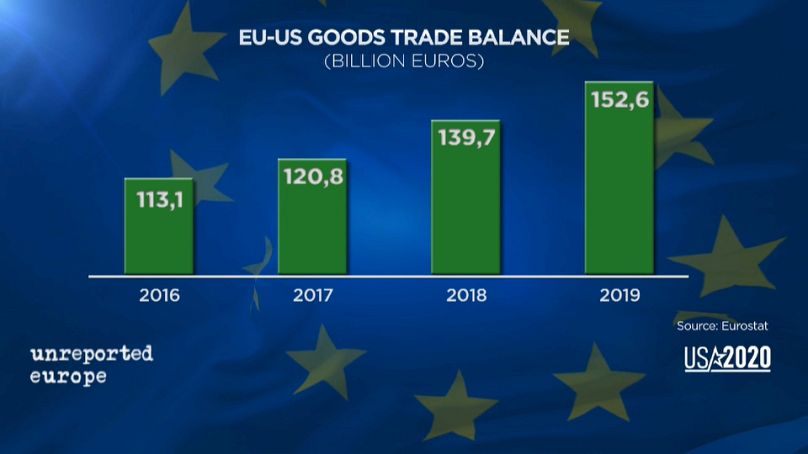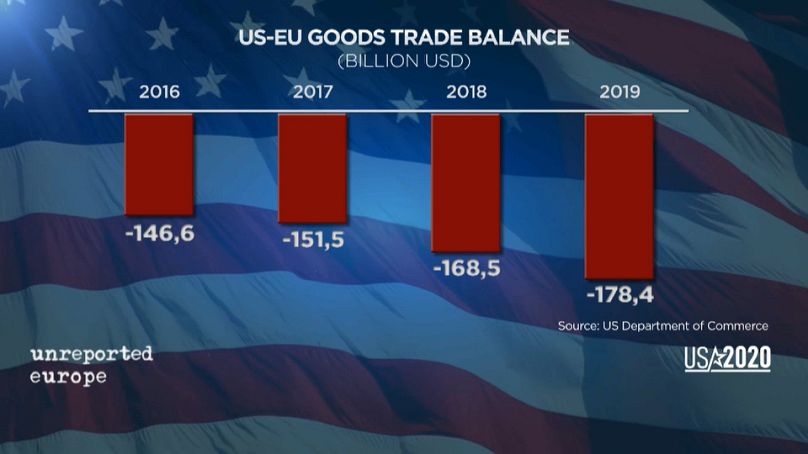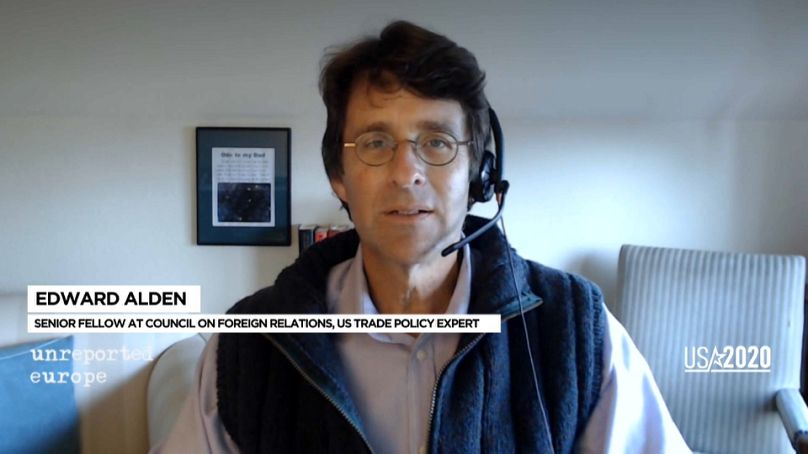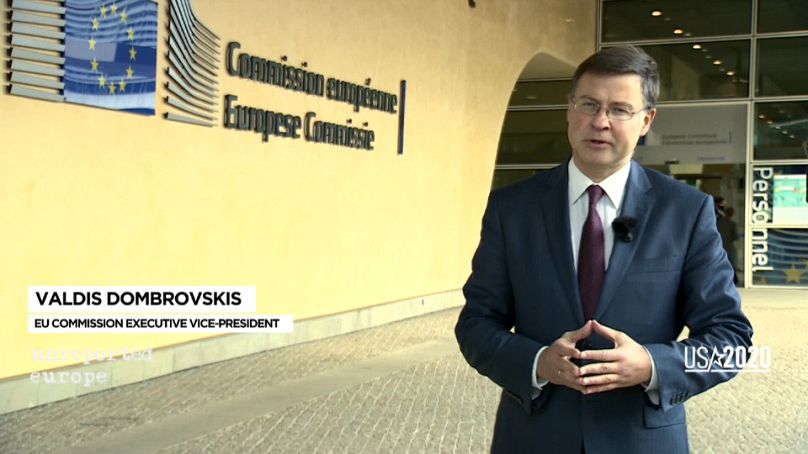Since Donald Trump's accession to the presidency in 2017, relations with the EU have often been turbulent, not least over trade. Unreported Europe investigates how the outcome of the upcoming election may affect tariffs and taxes which have flown in either direction during the last four years.
Trade conflict
 ADVERTISEMENT
ADVERTISEMENT
 ADVERTISEMENT
ADVERTISEMENT
Can the European economy expect any clouds to lift after the US elections? Described by Donald Trump as the United States leading commercial foe, the European Union has paid a high price for his America First policies.
How much more would the EU stand to lose from his re-election - and how much could it gain from a victory by Democrat candidate Joe Biden?
Wine industry turbulence
In the light of the changing face of transatlantic relations, nothing can be take for granted - that's what the people in this edition of Unreported Europe tell us, starting in the heart of France's vineyards.
Wine is one of a number of European food and drink products targeted by punitive tariffs.
Set in between the Burgundy and Beaujolais regions, wine producer and trader Maison Jean Loron send a quarter of their exports for sale in the American market.
But business got much harder a year ago, when French, German and Spanish wine exporters were hit by a new 25% tax on their exports to the US.
Preserving market shares in the US was crucial in the face of competition from American and hilean wines, but also Italian wines, not hit by the tariffs.
Philippe Bardet, Maison Jean Loron's CEO, said their options were limited:
“We made a decision that hit us in the wallet: to lower our prices to offset the taxes applied by the United States.
"That (figure) has run into several hundred thousand Euros. That’s a lot to us, it's our profit for the year.
"We (now) sell for nothing in the United States. So we hope there will be a way out of this, we’re not sure."
I asked him if he thought the situation would change if Democratic Party candidate Joe Biden won instead:
“Obviously, a change of President would be a good sign.
"But whatever happens, the situation isn’t going to resolve itself in the short term."
Airbus-Boeing feud
Exporters are the collateral victims of a long-running battle between Airbus and its American competitor, Boeing.
Ruling that European subsidies to Airbus were illegal, the World Trade Organization gave Donald Trump the green light to apply punitive tariffs worth some US $7.5 billion.
The response came last October: the WTO authorised the EU to impose tariffs on US goods worth $4 billion in retaliation for illegal subsidies to Boeing.
When asked who the US' biggest commercial foe was in an interview with CBS News in 2018, Trump had responded that they had "a lot of foes. I think the European Union is a foe. What they do to us in trade. They have really taken advantage of us.”
These comments came shortly after the EU imposed new taxes on US steel and aluminium exports, as well as a number of iconic American products such as Hardley Davidson motorbikes and Levi jeans.
This in itself had been a response to the US tariffs imposed earlier on European steel and aluminium products. The tug of war is not expected to lose momentum if Donald Trump wins the presidential election on November 3.
Valdis Dombrovskis, the EU Commission's Executive Vice President, and Commissioner for Trade, made it clear to me that if negotiations couldn’t solve trade disputes, the EU would definitely act:
“Our trade and investment relationship remains the largest and most important in the world.
"It's important to continue to engage (and) to continue to develop our transatlantic relations, because when the EU and US works together, we can also be a force for good in the world.
"But we have also been clear that when the US is taking unilateral steps, the EU is going to respond in a proportionate way.
"So although we do not intend to escalate the situation, we have to defend ourselves."
EU-US trade balance
Despite Donald Trump’s punitive tax policies, the European union’s trade surplus for goods with the United States has actually risen consistently since he came into power in January 2017:
So has the American goods trade deficit with the EU, reaching a peak at the end of last year:
A new offensive?
A new offensive is expected if the outgoing President wins a second term; threats of a 25% tax on European car imports have loomed since EU leaders announced they would impose digital service taxes on American tech giants.
The plans were suspended until the end of the year, the deadline for an agreement to be found.
The issue is just one of the contentious topics that are not expected to simply go away, whatever the outcome of the presidential election, according to experts on both sides of the Atlantic.
Edward Alden, a US trade policy expert and Senior Fellow at the Council on Foreign Relations told me that though he expects changes should Biden win, it's not the end of trade wars.
“I think the overall tone of the relations would improve dramatically under a Biden administration.
"But there are other issues which are (still) going to be very, very difficult: this digital tax issue - if anything, the Democrats are more beholden to the Silicon Valley digital giants like Google and Facebook than the Republicans are.
"The Boeing-Airbus (conflict) is not going to go away. And if you look at Joe Biden's platform, he has promised the most aggressive 'Buy American' policy that we have ever seen out of a president.
"I think you're going to see a very inward-looking United States.”
Indeed, the Democrat candidate has made it clear that domestic concerns will take priority over new trade deals, but there is hope for relief on trade wars and global cooperation issues.
Guntram B. Wolff, Director of the Bruegel Economic Think Tank, believes a changing of the guard in Washington would usher in a more constructive era of transatlantic cooperation:
“I'm quite convinced that Joe Biden will try to work with the Europeans to salvage what can be salvaged from the WTO.
"And there's the bilateral relations with Europe; I think Biden has sort of a pro-free trade view.
"I could well see us making some progress and and certainly when it comes to climate issues and carbon border adjustment, which is also a trade issue, I think we will find some deal with Joe Biden."
Sanctions on European firms
Questions remain on the future of sanctions imposed upon European firms doing business with Iran, China or Russia. Joe Biden has pledged to resume talks with Iran, but only once it complies with its nuclear commitments.
Biden shares Donald Trump's concerns over European dealings with Chinese tech firms and the Nordstream 2 gas pipeline project between Russia and Germany.
European unity?
These and other uncertainties are encouraging the European Union to be more unified, if it wants to be strong again.
Valdis Dombrovskis is all too aware of this:
“We remain open for business, open for free and fair trade.
"But on the other hand, we need to become more assertive in defending our interests, our values.
"We need to strengthen our trade defence and enforcement toolkit. And that's exactly what we are doing right now."
Edward Aldren agrees with Domrovskis' conclusions:
"I think the lesson is that the EU needs to stand up firmly for its own interests on trade.
I think it’s actually done that quite well in the last four years, which is why the Trump administration did not make as much progress on its complaints with Europe as it might have.
"But I think that will continue into the next four years, regardless of who becomes the next president."















